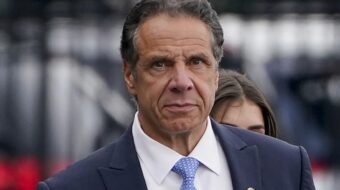Before the selection of Alaska’s governor, Sarah Palin, as the Republican vice presidential nominee, the 2008 campaign had been notable for the apparently declining influence of evangelical Christians on American politics. Notwithstanding the evangelicals’ strong support for his candidacy, Mike Huckabee failed to get the GOP presidential nomination. And for all the distortion of Barack Obama’s religion as supposedly Islamic rather than Christian, the controversy still offered hope that Americans of different faiths – or of no professed faith – might feel themselves to be the same full-fledged citizens as those who for years had insisted that America has always been and remains a Christian nation.
That hope, however, may be fleeting. When, last fall, Gov. Palin declared October 21-27 to be Alaska’s ‘Christian Heritage Week,’ she was not merely issuing the kind of routine, pro-forma proclamation. Instead, she made a political statement that the United States is indeed a Christian nation, thereby once again marginalizing non- Christians.
True, she was not the first Alaska governor to make such a declaration, but her predecessors had not embellished theirs with pseudo-historical quotations and interpretations. In encouraging ‘all citizens to celebrate this week,’ she indicated that no comparable proclamations for, say, Alaska’s Jews or Muslims would be forthcoming.
Gov. Palin’s statement cited the leading Founding Fathers as the ‘giants in the structuring of American history,’ who were avowedly ‘Christians of caliber and integrity’ and who ‘did not hesitate to express their faith’ in public and in policy. Going beyond the customary invocation of God found in so many American institutions at all levels – not least, the Supreme Court’s ‘God Save This Honorable Court’ – Palin quoted prominent figures out of context in order to bolster her case. Or tried to do so.
The figures whom Palin quoted are, in order of appearance in her document, Benjamin Franklin, George Washington, Thomas Jefferson, James Madison, Patrick Henry, and George Mason. Franklin said that ‘It is impossible to build an empire without our Father’s aid,’ while Washington ‘enunciated’ that we would prosper if ‘animated alone by the pure spirit of Christianity.’ Jefferson asked if the nation’s liberties could be ‘secure when we have removed the conviction that these liberties are the gift of God.’ Madison promoted ‘the diffusion of the light of Christianity in our nation.’ Henry quoted Proverbs 14:34 that ‘Righteousness alone can exalt a nation, but sin is a disgrace to any people.’ Finally, Mason insisted that ‘it is the mutual duty of all to practice Christian forbearance, love and charity towards each other.’
Only Washington’s statement would appear to embrace a purely Christian nation, but Washington is also revered for, among other things, advocating the right of Jewish Americans to practice their faith. Franklin, Madison, and Mason were at most promoting Christianity as a useful but not monopoly religion. Neither Jefferson nor Henry even mentions Christianity despite the latter’s quotation from the New Testament. We are left, then, with modest evidence for Palin’s exclusionary proclamation.
More important, serious scholars of American history and religion have never read the Founding Fathers as envisioning the new nation as purely Christian. Although they have differed on particulars, they have always emphasized that most of the colonial leaders believed in a firm separation of church (and synagogue) and state. Intolerant Puritan Massachusetts Bay Colony was not the model they had in mind. More appealing in terms of tolerance of diverse faiths were Roger Williams’ Rhode Island and William Penn’s Pennsylvania.
It’s sad that, in an election year that will presumably provide the nation with either its first African-American president or its first female vice president, Gov. Palin has tried to minimize her state’s religious diversity and, by extension, that of the entire country. Let’s hope that, if she does become vice president, she will rethink her position. To do so would acknowledge the original ‘Washington elite’ that all contemporary Americans, regardless of their religious beliefs, should continue to honor.
Howard P. Segal is professor of history at the University of Maine.









